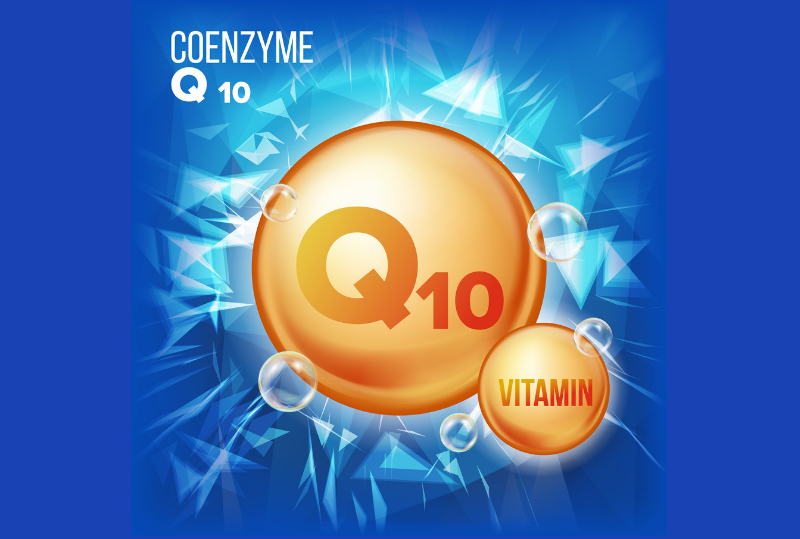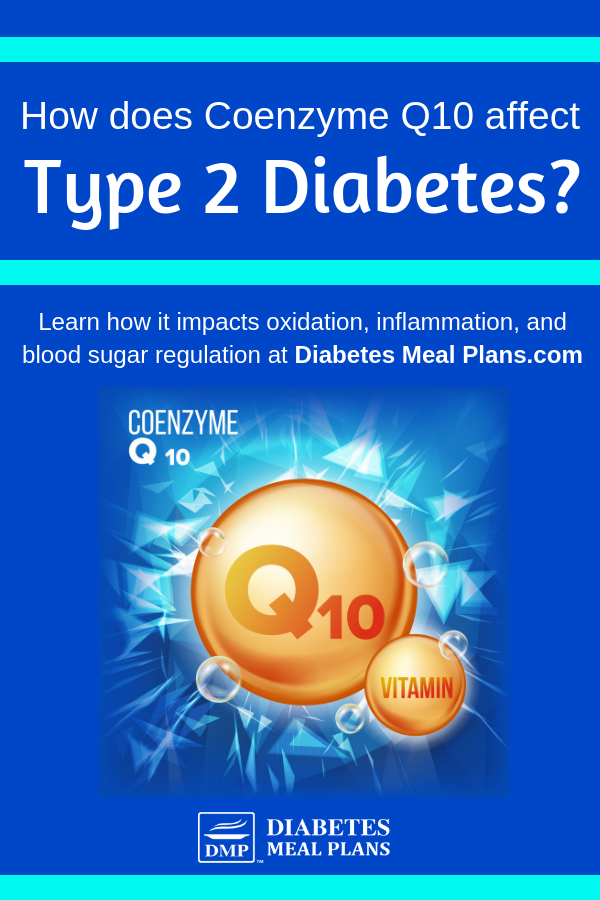When you think of the term “antioxidants,” what image comes to mind?
You might envision a bounty of “superfoods” like dark chocolate, red wine, and fresh blueberries (which sounds delicious). But those foods aren’t the only way to get your daily dose of antioxidants.
Supplements like Coenzyme Q 10 (CoQ10 for short) are also powerful antioxidants. And Coenzyme Q10 and diabetes make a great match!
Not only is it a powerful antioxidant to fight against the oxidative stress that occurs in diabetes. CoQ10 also has anti-inflammatory properties that can impact your heart health, blood sugar regulation, and energy levels for the better.

What is CoQ10?
Coenzyme Q10 is a nutrient belonging to a class of compounds called ubiquinones. Ubiquinones are almost equivalent to vitamins, the difference is all humans can produce ubiquinones.
Generally speaking, your body can produce enough CoQ10 so you don’t technically need to consume any outside sources. Certain genetic conditions, although very rare, could cause low CoQ10 production.
CoQ10 works closely with your cellular mitochondria, which is often described as the powerhouse of your cells! And, as you might have guessed, CoQ10 is linked to diabetes and heart disease.
How does Coenzyme Q10 work?
Two primary functions of CoQ10 are:
- Facilitating energy production
- Antioxidant capabilities
CoQ10 is most known for facilitating the production of ATP (energy); remember, it works closely with your mitochondria.
Organs that have the highest energy needs, such as your heart, liver, and kidneys, have the highest concentrations of CoQ10.
Under normal circumstances, glucose (sugar) is transported from your bloodstream into the cells, and from there glucose is metabolized into energy.
Without sufficient CoQ10 concentrations, both ATP (energy) production and glucose metabolism in disrupted.
So it makes sense that research has found decreased levels of CoQ10 in patients with type 2 diabetes. Insufficient CoQ10 causes poor glucose metabolism.
One explanation for this is that high blood sugar creates oxidative stress and inflammation within your body. Other factors that can increase inflammation include being overweight, high stress level, and consuming a diet rich in processed foods.
Coenzyme Q10 also works as an antioxidant to counteract oxidative stress, but because inflammation is so rampant in type 2 diabetes, your body’s natural reserves of CoQ10 are frequently used up, and hence levels may be low.
Insufficient CoQ10 causes problematic glucose metabolism. And so it can become a vicious cycle – high blood sugar causing inflammation and decreased CoQ10 concentration, and inflammation and low CoQ10 causing further high blood sugar.
By consuming more antioxidants, which include CoQ10 (and also a myriad of other antioxidants found in vegetables and fruits), you can help keep inflammation in check and optimize glucose control.
Research on Coenzyme Q10 and Diabetes
A 2017 study provided patients with either 200 mg of CoQ10 or a placebo for 12 weeks. After CoQ10 supplementation, HbA1c levels decreased from 8.6% to 7.9%; this trend was not observed in the placebo group. That’s a 1.3% reduction in A1c!
In another study, fifty patients with diabetes were instructed to take either 150 mg of CoQ10 or a placebo. After 12 weeks, fasting blood sugar decreased from 131 mg/dL (7.3 mmol/l) to 115 mg/dL (6.4 mmol/l) in the supplementation group; HbA1c decreased from 6.83% to 6.44% – a 0.39% reduction.
Additionally, researchers found that supplementing with 100mg of CoQ10 for 8 weeks was effective in improving insulin levels, decreasing insulin resistance, and improving beta-cell (pancreatic cell) function in patients with metabolic syndrome.
In patients with established diabetic neuropathy, 100mg of CoQ10 supplementation for 12 weeks lowered HbA1c by 1.1%, compared to only a 0.1% reduction in the placebo group. Researchers also saw improvements in insulin resistance in those taking the supplement.
In contrast, Moradi et al., who noted marginal decreases in fasting blood sugar after CoQ10 supplementation, saw no improvement in HbA1c and insulin levels.
Similar results were found in a 2015 analysis involving 356 patients. CoQ10 supplementation was ineffective at improving glycemic control. The one positive outcome was the reduction of triglyceride levels by −0·26 mmol/L after supplementation.
Preliminary research in animals suggestsCoQ10 could help diabetic neuropathy. One mouse study found early CoQ10 supplementation prevented nerve conduction impairment and sensory problems, which was observed readily in matched controlled subjects that were not given supplementation.
Overview
Coenzyme Q10 may assist people with type 2 diabetes with:
- Glucose control
- Reduction in A1c
- Improved beta cell function and insulin levels
- Decreased insulin resistance
Research on Coenzyme Q10 and Cardiovascular Health
Preliminary research shows CoQ10 can be effective in improving heart health and reducing the risk of cardiac failure. Not only are CoQ10 levels often lower in patients with diabetes, but levels are also lower in patients with heart failure and heart disease.
To add to that, a large 2015 meta-analysis showed CoQ10 levels were significant decreased after treatment with statins, a popular cholesterol lowering medication. Research suggests that statin therapy could lead to a reduction of CoQ10 levels by as much as 40%!
So not only is CoQ10 involved in regulating your blood sugar levels, but there is also an intricate connection to your heart health – and the commonality is inflammation.
A 2018 meta-analysis demonstrated CoQ10 significantly lowered systolic blood pressure (top number) in patients with metabolic syndrome; a small decrease was also observed in diastolic blood pressure (bottom number), but the decrease was not significant.
Research has shown that CoQ10 supplementation (doses ranging from 60mg/day to 200mg/day) improves ejection fraction by as much as 3.7%. Ejection fraction is how much blood your heart is pumping, in heart failure your heart cannot pump blood as efficiently as it should. This study noted the biggest improvement in ejection fraction was seen in patients not already taking heart medications.
Similar results were found in an analysis conducted by Fotino et al. After supplementation, ejection fraction improved by 3.6%.
A meta-analysis of 9 studies demonstrated a 1.4% reduction in mortality (death) for those heart failure patients taking CoQ10. Some of the studies included also reported less hospitalizations with the supplementation.
In fact, research concludes that CoQ10 level is an independent predictor of mortality in cardiac patients.
Lei and Lui also observed reduced mortality as well as an increase in exercise capacity in those patients with cardiac failure who were taking CoQ10.
Overview
Coenzyme Q10 may assist with cardiovascular health in the following ways:
- Reduce risk of cardiac failure
- Reduce inflammation associated with heart disease
- Improve efficiency of heart function
- Decrease risk of death from heart failure
Research on Coenzyme Q10 and Inflammation
CoQ10’s antioxidant properties have been shown to help reduce inflammation, and even improve conditions such Non Alcoholic Fatty Liver Disease (NAFLD) and metabolic syndrome.
CoQ10 is effective at reducing the presence of inflammatory markers such as C-reactive protein, interleukin-6, and tumor necrosis factor. Doses of CoQ10 supplementation required to produce such a result ranged from 60 mg per day to 300 mg per day.
Nesami and colleges confirmed that 12 weeks of 100 mg of CoQ10 supplementation is effective at reducing inflammatory markers (C-reactive protein and interleukin-6) in mildly hypertensive adults.
Coenzyme q10 supplementation may also reduce inflammatory markers that are specifically related to NAFLD. Supplementation of Coq10 has ameliorated many of the symptoms of NAFLD in recent trials.

Supplementing with CoQ10
Due to inconsistent results there are no research based recommendations when it comes to supplementing with CoQ10.
The standard supplemental dose for coenzyme Q10 ranges from 90 mg to 200 mg per day.
Supplements come in two forms – ubiquinol and ubiquinone; ubiquinol is more readily absorbed.
As with all supplements, check with your doctor before starting. This is especially important for those taking statins, as there is a possible nutrient-drug interaction between the two.
And one last point about CoQ10 supplementation – antioxidants work better as a team!
Taking mega-doses of coenzyme Q10 isn’t necessarily going to be beneficial if there aren’t enough other antioxidants floating around in your cells to work with the CoQ10.
This means regardless if you choose to supplement, you want to consume a diet rich in other antioxidants such as vitamins A, C, and E.
Foods relatively higher in CoQ10, that also have a nice balance of other antioxidants include:
By eating a variety of whole, unprocessed foods you will ensure you’re getting enough CoQ10 plus all the other necessary vitamins and minerals to ensure optimal antioxidant function.
Recommended Supplements
Conclusion
CoQ10 is intricately involved in energy production and glucose metabolism.
CoQ10 is also known for its antioxidant capacity, which impacts your blood sugar levels and cardiac function. It can also reduce inflammation, which has a very positive influence on your health.
Research suggests that supplementing with coenzyme Q10 may be beneficial for some people with type 2 diabetes and prediabetes. However, there are currently no guidelines for supplementation in terms of dosage. The best practice here would be to follow the supplement manufacturers instructions.
CoQ10 supplementation is generally recognized as safe with minimal side effects. But it’s always best to check with you doctor.





Oosha
Very informative. Thanks for daily mails. Sugars are still in150-133. Today started with149 and after breakfast, 125. True that it is what you eat👍
I do believe in Keto diet. Boring meals are getting into tasty preps. I am very positive about following for two-three months will be very helpful and am looking forward to start in August, as I mentioned, without ineruption, and after my vacation
Usha
Jedha: Nutritionist (MNutr)
Hi Oosha, just to be clear we do not promote keto diet but low carb, there is a difference. Glad you’re tastes are changing and you’re feeling positve!